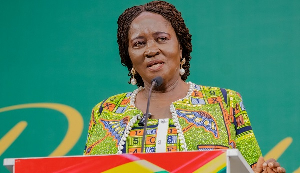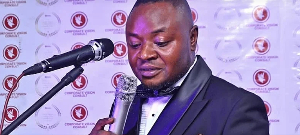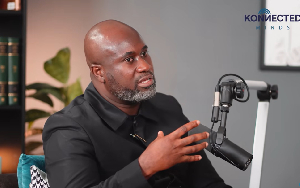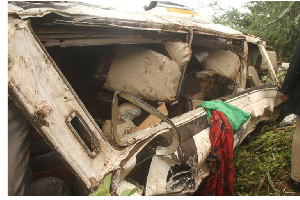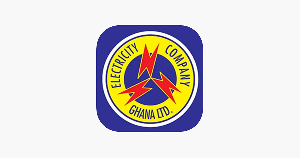And The Chance Of Winning The Presidency And Forming A Government Will Follow In Due Course; My Second Appeal To “The Big Names” In CPP and PNC!
By Otchere Darko
[*Readers who are not sure about this writer and get confused about his name and identity may please read the information placed at the bottom of this article.]
My wish in contemporary Ghanaian politics has been the emergence of a strong “third party” that can position itself as a possible and highly probable “government in waiting”. However, in my opinion, based on the way things currently stand and are expected to remain between now and the commencement of the 2012 elections, both CPP and PNC are not at this strategic position yet, because of the smallness of their current parliamentary numbers. From their current electoral weak positions, it is improbable, and even statistically impossible for either party to win the impending elections and be able to form government in 2013. I am sure, however, that each individual “big name” in the two parties has more than a fifty percent chance of winning a parliamentary seat in some constituencies within the regions where their parties have relatively high electoral strength. I do believe that “big names” like Dr Nduom, Professor Akosah, Mr Aggudey, Dr Mahama, for example, are all likely to win the parliamentary seats they contest, if they were to stand as parliamentary candidates in the regions where their parties have strong local support. However, none of these or any other “big name” in either of the two Nkrumahist parties has the “political backbone” to “knock down” both Professor Mills and Nana Akufo-Addo to win the presidential contest, given that “luck” plays virtually no part in elections. It is on the basis of this sober and honest consideration that I appeal to all “the big names” in the two biggest “third-parties” to put their names forward for parliamentary candidacy in their respective parliamentary primaries that will lead to the final selection of those that will stand for them in the 2012 parliamentary elections.
By this appeal, I am NOT suggesting that the CPP and the PNC should not put up presidential candidates. Yes, they should, because the presidential and parliamentary candidates together form an “electoral package” that confers on both candidates a symbiotic advantage in constituencies where their parties are strong and where, especially, voters are not likely to vote “skirt and blouse”. Thus, CPP and PNC may either put up two separate presidential candidates or one joint flagbearer, in order to help boost up the votes of their parliamentary candidates. My point is that, after this, all the remaining “big names” that fail to get elected as their party’s flagbearer, together with other “big names” that do not take part in the presidential primaries should enter their party’s parliamentary primaries and get their party’s mandate to contest in the parliamentary elections in constituencies, and within regions where their parties have relative strengths. Where parliamentary and presidential primaries are held concurrently, the “big names” must put their names forward for both elections. Such “big names” should not consider themselves to be too big to contest for parliamentary seats. By putting themselves up for, and winning parliamentary seats, these “big names” will be helping their parties to win more parliamentary seats in 2012 to help raise the combined total of the two Nkrumahist parties from their current total of three to about twenty or more; and, thereby, help put these two parties in better parliamentary positions that will enable them to be able to tilt the balance of parliamentary power between the two dominant parties towards the direction where these two “third-party” groups cast their votes. By being able to influence parliamentary decisions and votes through their bigger parliamentary numbers, the CPP and the PNC, acting together or separately, can force Parliament to take right decisions or pass right laws that are in the nation’s best collective interest. It is the ability of CPP and PNC to influence parliamentary decisions and actions through bigger parliamentary numbers that they can hope to hold the two dominant parties to account for their actions and inaction while in government. It is also this influence that will convince the Ghanaian electorate that there is a strong and viable “third party” that is ready and able to form a government.
Let the “big names” do what will bear political fruits. Thus, let them help their parties to strengthen their parliamentary numbers to levels that will put them in positions where they can effectively influence Parliamentary direction, weaken NDC/NPP political dominance, and silence the anti-peace “war drums” that the two parties constantly beat through their “foul-mouthed” leaders. This is the best thing the “big names” in CPP and PNC can do to help move their parties out of the cycle and syndrome of being “tiny” and “unimportant” political groups that merely symbolise “worthlessness”.
Source: Otchere Darko; [Personal Political Views].
*About the Author:
[This appendage is for the information of only readers who get confused about this particular writer because of the name he uses, and who therefore need to know more about him or about the name he uses. Ignore this appendage, if you are not one of such readers. *This writer is just one of hundreds, and possibly thousands of Ghanaians who use the name “Otchere Darko”, either on its own, or in combination with other names. Some users spell this same name as “Okyere Darko”, while other users conjoin it with the help of a hyphen to become one single compound name, “Otchere-Darko” or “Okyere-Darko”, depending on which spelling-mode they choose. This writer, who has officially used this ‘simple name’ from his school days in the sixties into the seventies and continues to use it officially to this very day, attended the School of Administration of University of Ghana where he finally left in September 1977, the year that students embarked on the “UNIGOV” demonstration. He has never before, or after September 1977 been a student of the Ghana Law School. Up to the end of 1981, he worked as a senior public servant in, and for one of the mainstream Ministries in Ghana. He is not working for, and has never worked at the Danquah Institute. He is currently also not a member of NPP, or of any other party in Ghana. He is not related to any practising Ghanaian politician who uses this same or other name. *May readers concerned, please, take note of this exhaustive clarification and stop drawing wrong conclusions that sometimes lead them to attack a wrong person. Thank you for taking note.]
Opinions of Sunday, 4 September 2011
Columnist: Darko, Otchere


